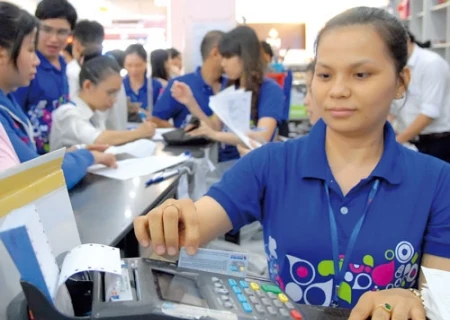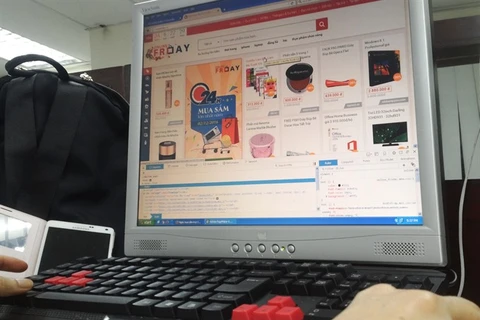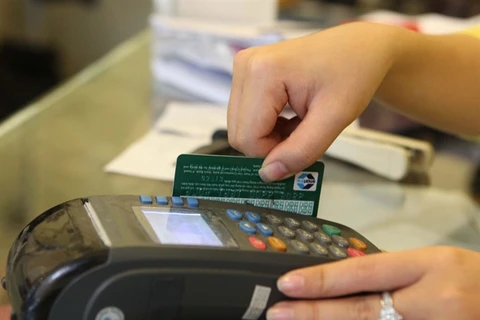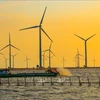Hanoi (VNA) - Cash as a mode of payment has declined in the country by 2 percent in the past six years, from 14.02 percent in 2010 to the current 12 percent.
As per the State Bank of Vietnam’s report released this week, the country currently has around 67.4 million bank accounts compared to 16.8 million accounts in 2010.
Modern infrastructure and technology to facilitate non-cash payments, especially online payments, have developed significantly. The number of bank cards has increased by 11.36 percent against the end of 2015, to around 111 million now.
There are around 254,000 points of sales (POS) and 17,380 automatic teller machines (ATMs), up 13.77 percent and 5.39 percent, respectively, compared to end of 2015.
The central bank has issued many policies relating to modern infrastructure and technology to boost non-cash payments, to protect customer interests, and ensure quality of service.
It has instructed commercial banks to quickly carry out a plan to convert all magnetic cards into chip cards to prevent fraud. Under the plan, all ATM cards will become EMV-standard chip cards by 2020, to reduce risks in e-commerce for both buyers and sellers.
To protect the interests of customers, in October 2016, the central bank issued Circular 30/2016/TT-NHNN, which requires credit card service providers to compensate card owners for loss not caused by the owners, starting November 28, 2016.
The Government also recently approved a policy encouraging cashless transactions in Vietnam in order to reduce the number of cash-based deals, improve electronic payment methods and control tax evasion.
Under the plan, by 2020, cash transactions in the country will be account for less than 10 percent of total market transactions. As per the plan, all supermarkets, shopping malls and distributors will accept credit cards; 70 percent of water, electronics and telecommunication service providers will accept cash-free payments from households and individuals; and 50 percent of the total urban households will use electronic payment for daily transactions.
The policy also proposes the development of new payment methods for rural and remote areas in order to encourage financial inclusion and increase overall access to services. At least 70 percent of Vietnamese citizens over the age of 15 will have bank accounts by the end of 2020. Social welfare and pensions will be paid through electronic payment methods.-VNA
As per the State Bank of Vietnam’s report released this week, the country currently has around 67.4 million bank accounts compared to 16.8 million accounts in 2010.
Modern infrastructure and technology to facilitate non-cash payments, especially online payments, have developed significantly. The number of bank cards has increased by 11.36 percent against the end of 2015, to around 111 million now.
There are around 254,000 points of sales (POS) and 17,380 automatic teller machines (ATMs), up 13.77 percent and 5.39 percent, respectively, compared to end of 2015.
The central bank has issued many policies relating to modern infrastructure and technology to boost non-cash payments, to protect customer interests, and ensure quality of service.
It has instructed commercial banks to quickly carry out a plan to convert all magnetic cards into chip cards to prevent fraud. Under the plan, all ATM cards will become EMV-standard chip cards by 2020, to reduce risks in e-commerce for both buyers and sellers.
To protect the interests of customers, in October 2016, the central bank issued Circular 30/2016/TT-NHNN, which requires credit card service providers to compensate card owners for loss not caused by the owners, starting November 28, 2016.
The Government also recently approved a policy encouraging cashless transactions in Vietnam in order to reduce the number of cash-based deals, improve electronic payment methods and control tax evasion.
Under the plan, by 2020, cash transactions in the country will be account for less than 10 percent of total market transactions. As per the plan, all supermarkets, shopping malls and distributors will accept credit cards; 70 percent of water, electronics and telecommunication service providers will accept cash-free payments from households and individuals; and 50 percent of the total urban households will use electronic payment for daily transactions.
The policy also proposes the development of new payment methods for rural and remote areas in order to encourage financial inclusion and increase overall access to services. At least 70 percent of Vietnamese citizens over the age of 15 will have bank accounts by the end of 2020. Social welfare and pensions will be paid through electronic payment methods.-VNA
VNA

























